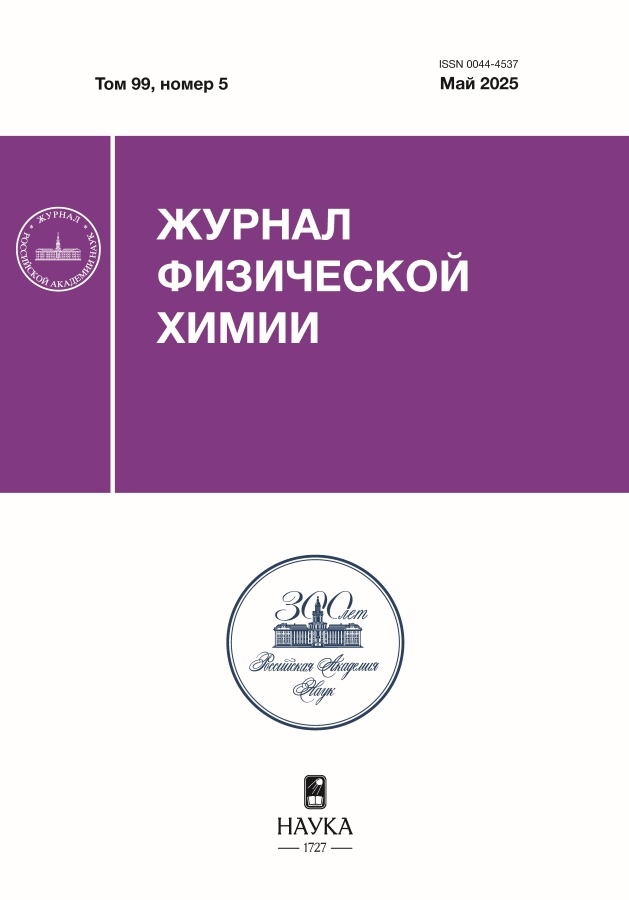Thermal decomposition of copper oxalate and potassium oxalatocuprate according to in operando XPS data
- Autores: Lomova N.V.1, Kazantseva I.S.1, Shumilova M.A.1, Pastukhova N.N.1, Isupov N.Y.1, Rybin D.S.1, Chausov F.F.1, Boldyrev V.V.2
-
Afiliações:
- Udmurt Federal Research Center of the Ural Branch of the Russian Academy of Sciences
- V. V. Voevodsky Institute of Chemical Kinetics and Combustion, Siberian Branch of the Russian Academy of Sciences
- Edição: Volume 99, Nº 5 (2025)
- Páginas: 800-812
- Seção: IN MEMORY OF PROFESSOR E.P. ELSUKOV
- ##submission.dateSubmitted##: 22.09.2025
- ##submission.datePublished##: 15.12.2025
- URL: https://kazanmedjournal.ru/0044-4537/article/view/691154
- DOI: https://doi.org/10.31857/S0044453725050156
- EDN: https://elibrary.ru/hfmxlq
- ID: 691154
Citar
Texto integral
Resumo
Thermal decomposition processes in the rangefrom room temperature to 400°C of copper(II) oxalate CuC2O4⋅½H2O and potassium oxalate cuprate(II) K2Cu(C2O4)2⋅2H2O in vacuum at the residual pressure 10–5mm Hg with XPS and Auger spectra recordedin operandoare studied. An X-ray photoelectronspectrometer with a magnetic energy analyzer is used. The analysisof XPS and Auger spectroscopy data shows that thermal decompositionof CuC2O4⋅½H2O involves the stages ofdetachment of crystallization water (150–265°C), CO2(265–285°C)with an unstable intermediate product formed and decomposed at 285°C with the metallic copper residue formed with admixtureof 11–13 mol. % of copper(I) oxide. Thermal decomposition of K2Cu(C2O4)2⋅2H2O involves the stages of elimination of crystallization water (85–120°C) anddecomposition of the obtained anhydrous oxalate with elimination of CO2and CO (250–290°C).
Palavras-chave
Sobre autores
N. Lomova
Udmurt Federal Research Center of the Ural Branch of the Russian Academy of Sciences
Email: chaus@udman.ru
Izhevsk, 426067 Russia
I. Kazantseva
Udmurt Federal Research Center of the Ural Branch of the Russian Academy of Sciences
Email: chaus@udman.ru
Izhevsk, 426067 Russia
M. Shumilova
Udmurt Federal Research Center of the Ural Branch of the Russian Academy of Sciences
Email: chaus@udman.ru
Izhevsk, 426067 Russia
N. Pastukhova
Udmurt Federal Research Center of the Ural Branch of the Russian Academy of Sciences
Email: chaus@udman.ru
Izhevsk, 426067 Russia
N. Isupov
Udmurt Federal Research Center of the Ural Branch of the Russian Academy of Sciences
Email: chaus@udman.ru
Izhevsk, 426067 Russia
D. Rybin
Udmurt Federal Research Center of the Ural Branch of the Russian Academy of Sciences
Email: chaus@udman.ru
Izhevsk, 426067 Russia
F. Chausov
Udmurt Federal Research Center of the Ural Branch of the Russian Academy of Sciences
Email: chaus@udman.ru
Izhevsk, 426067 Russia
V. Boldyrev
V. V. Voevodsky Institute of Chemical Kinetics and Combustion, Siberian Branch of the Russian Academy of Sciences
Autor responsável pela correspondência
Email: chaus@udman.ru
Novosibirsk, 630090 Russia
Bibliografia
- Clarke R.M., Williams I.R. // Mineralogical Magazine. 1986. V.50. P. 295. https://doi.org/10.1180/minmag.1986.050.356.15
- Chisholm J.E., Jones G.C., Purvis O.W. // Mineralogical Magazine. 1987. V. 51. P. 715. https://doi.org/10.1180/minmag.1987.051.363.12
- Kirschner S., Mclean J.A., Meerman G.Potassium Dioxalatocuprate(II)2-Hydrate. In the Book: Inorganic Syntheses, 2007, 1–2. https://doi.org/10.1002/9780470132371.ch1
- Ren W.-X., Li P.-J., Geng Y., Li X.-J. // J. Hazardous Materials. 2009. V. 167. P. 164. https://doi.org/10.1016/j.jhazmat.2008.12.104
- Dollimore D. // Thermochimica Acta.1987. V. 117.P. 331. https://doi.org/10.1016/0040-6031(87)88127-3
- Salavati-Niasari M., Davar F., Mir N. // Polyhedron. 2008. V. 27. № 17.P. 3514. https://doi.org/10.1016/j.poly.2008.08.02
- Liujin L. Method for preparing ultra-fine copper powder: Pat. 104475748 ofChina, 2015.
- Lamprecht E., Watkins G.M., Brown M.E. // Thermochim.Acta. 2006. V. 446. P. 91. https://doi.org/10.1016/j.tca.2006.03.008
- Mohamed M.A., Galwey A.K. // Thermochimica Acta. 1993. V. 217.P. 263. https://doi.org/10.1016/0040-6031(93)85115-p
- DonkovaB., Mehandjiev D. // J.of Materials Science. 2005. V. 40. № 15. P. 3881. https://doi.org/10.1007/s10853-005-0487-0
- Dubicki L., Harris C.M., Kokot E., Martin L. // Inorg. Chem. 1966. V. 5. P. 93. https://doi.org/10.1021/ic50035a023
- Schmittler H. // Monatsberichte der Deutsche Akad. Wiss. Berlin.1968. V. 10. P. 581.
- Fichtner-Schmittler H. // Kristall undTechnik. 1979. V. 14. P. 1079. https://doi.org/10.1002/crat.19790140908
- Christensen A.N.,Lebech B., Andersen N.H., Grivel J.-C. // Dalton Trans. 2014.V. 43. P. 16754. https://doi.org/10.1039/c4dt01689k
- Udupa M.R. // Thermochimica Acta. 1982. V. 55. № 1. P. 117. https://doi.org/10.1016/0040-6031(82)87013-5
- Sarada K., Muraleedharan K. // J. of ThermalAnalysis and Calorimetry. 2015. V. 123. № 1. P. 643. https://doi.org/10.1007/s10973-015-4988-z
- Kornyakov I.V., Gurzhiy V.V., Kuz’mina M.A., et al. // Int.J. Mol. Sci. 2023. V. 24. Article Number 6786. https://doi.org/10.3390/ijms24076786
- Chenakin S.P., Szukiewicz R., Barbosa R., Kruse N. //J. Elec. Spec. Rel. Phenom. 2016. V. 209. P. 66. https://doi.org/10.1016/j.elspec.2016.04.001
- Rückriem K., GrotheerS., Vieker H., et al. // Beilstein J. Nanotech. 2016. V. 7. P. 852. https://doi.org/10.3762/bjnano.7.77
- Chenakin S., Kruse N. // Appl.Surf. Sci. 2020. V. 515. Article Number 146041. https://doi.org/10.1016/j.apsusc.2020.146041
- Chenakin S.,Kruse N. // J. Phys. Chem.C. 2019. V. 123. № 51. P. 30926. https://doi.org/10.1021/acs.jpcc.9b07879
- Viswamitra M.A. // Zeitschrift für Kristallographie. 1962. V. 117.P. 437. https://doi.org/10.1524/zkri.1962.117.5-6.437
- Jeter D.Y., Hatfield W.E. // Inorg.Chim. Acta. 1972. V. 6. P. 523. https://doi.org/10.1016/s0020-1693(00)91850-4
- Zhang B., Zhang Y., Zhang J., et al. // CrystEngComm.2016. V. 18. № 27. P. 5062. https://doi.org/10.1039/c6ce00786d
- Darley J.R., Hoppe J.I. // J. Chem. Educ. 1972. V.49. № 5. P. 365. https://doi.org/10.1021/ed049p365
- Jun L., Feng-XingZ., Yan-Wei R., et al. // Thermochim. Acta. 2003. V.406. № 1–2. P. 77. https://doi.org/10.1016/s0040-6031(03)00221-1
- Tanaka K. // J. Inorg. and Nuclear Chem. 1981. V. 43. № 11. P. 2999. https://doi.org/10.1016/0022-1902(81)80662-8
- Rahimi-Nasrabadi M., Pourmortazavi S.M., Davoudi-DehaghaniA.A., et al. // CrystEngComm. 2013. V. 15. № 20. P. 4077. https://doi.org/10.1039/c3ce26930b
- Edwards H.G.M., Farwell D.W., Rose S.J., Smith D.N. // J. Mol. Struc. 1991.V. 249. № 2–4. P. 233. https://doi.org/10.1016/0022-2860(91)85070-j
- Trapeznikov V.A.,Shabanova I.N., Kholzakov A.V., Ponomaryov A.G. // J. Elec.Spec. Rel. Phenom. 2004. V. 137–140. P. 383. https://doi.org/10.1016/j.elspec.2004.02.115
- Wojdyr M. // J. Appl. Cryst. 2010. V. 43. № 5. P. 1126. https://doi.org/10.1107/S0021889810030499
- Biesinger M.C. // Surf.Interf. Anal. 2017. V. 49. № 13. P. 1325. https://doi.org/10.1002/sia.6239
- Ganguly A., Sharma S., Papakonstantinou P., Hamilton J. // J. Phys. Chem. C. 2011. V. 115. № 34.P. 17009. https://doi.org/10.1021/jp203741y
- Edwards D. // Inorg. Chim.Acta. 1976. V. 18. P. 65. https://doi.org/10.1016/s0020-1693(00)95586-5
- Rudd J.A.,Jones D.R., Dunnill C.W., Andreoli E. // Surf. Sci. Spec.2019. V. 26. № 1. Article Number 014013. https://doi.org/10.1116/1.5091615
Arquivos suplementares










